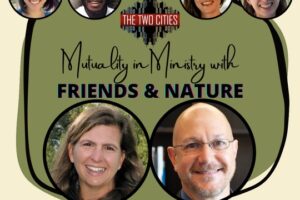Don’t ever condemn someone to the “friend zone.” If you do, that person will become a stripper. That’s the moral of the stage musical Rock of Ages, which some of my co-bloggers and I caught during a weekend trip to Las Vegas last month.
The first act launches a love story between Drew, a busboy who dreams of being a rock star, and Sherrie, an aspiring actress who’s just moved to Hollywood. The two form an immediate connection – just what the audience expects. But, of course, every love story needs some conflict. In Rock of Ages, it’s not an “ancient grudge” between two families, or the pride of one person and the prejudice of another. No, the real drama comes when Drew, attempting to ease the tension on a date, dares to suggest that he and Sherrie are friends.
WHOA! WHAT? NOT COOL!
“Friendship” is the F-bomb that blows everyone’s happiness to smithereens. Sherrie, hurt by Drew’s declaration, sleeps with a washed-up rock star and becomes an exotic dancer. Drew’s dreams of rock stardom are dashed when he’s forced to front a boy band. Everyone is miserable. All because someone said “We’re friends.”
Now, the audience anticipates – and paid good money for – a happy ending. And in the world’s eyes this means one of two things: our heroes must either find true love elsewhere, or they must reunite, move past the restraints of friendship, and become full-fledged lovers.
Can you guess which happens?
In the final scene, Drew and Sherrie (now pregnant) take the stage as the cast rejoices, happy that our heroes made it out of the friend zone alive. The audience – equally jubilant – is totally unaware that they’ve been duped into celebrating a false solution: that the only way to be happy is to cruise past the friend zone into a realm marked by sex, romance, and exclusivity.
This is nothing new, and we fall for it all the time. (Who could honestly say they were satisfied with Jim and Pam’s friendship in the first three seasons of The Office?) Our culture views friendship as something that falls short of love, something that limits love. To the world, friendship is not something to pursue; it’s something to move beyond. It’s a testament to how much we – society, the Church – devalue friendship.
Since “coming out” as a Christian who experiences same-sex attraction, I’ve talked to friends and family (and a few online trolls) who think that, because of my commitment to singleness, my life will be void of love. They believe I have needs that can only be met by the love of a spouse, not by the love of a friend – and certainly not by the love of God.
But that’s why, for people who are single and committed to celibacy, the friend zone is a beautiful thing – a crucial thing. It’s the avenue God has given us to express love. Through friendship, we form some of our most meaningful relationships and deepest bonds. It’s how we build families; it’s how we foster community. Love flourishes in friendship. It compels us to do radical things for each other. Ruth left her homeland and everything she’d ever known, not because she was in love, but because she was deeply committed to Naomi. Jonathan betrayed his father and risked his own life, not because he was in love with David, but because “he loved him as his own soul” (1 Samuel 18:1). It’s a kind of deep-rooted friendship that we can barely imagine in our culture, but one that we sorely need.
Thankfully, the Church is starting to rediscover the gift of friendship, especially for those whose sexuality and commitment to God’s design for marriage have made celibacy a happy reality. The folks at Spiritual Friendship, for example, have done an excellent job exploring the role of friendship in the Church, and recasting it in a positive light. It’s the kind of stuff that makes me think friendship has a future.
As Christians, married or single, we ought to welcome everyone into our friend zone, as we strive to be the kind of friend Scripture esteems: the kind that loves at all times (Proverbs 17:17), offers counsel (Proverbs 27:9), and even lays down his life for others (John 15:13). “Friend” means more than we think. And redeeming the friend zone – countercultural as it may be – will do more good than we know.
Bryan can be reached at The Happy Alternative





2 Comments
Leave your reply.